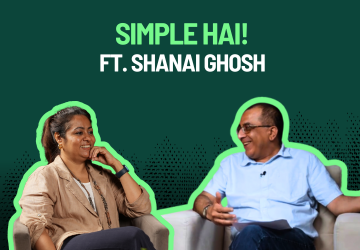
In an enlightening episode of the Simple Hai! podcast, hosted by veteran finance journalist Vivek Law, Shanai Ghosh, MD & CEO of Zuno General Insurance, shared her professional journey, views on health insurance adoption in India, and the innovations shaping the future of insurance. The conversation emphasized why health insurance is a critical financial necessity—especially in today’s rapidly changing world.
Health Insurance: A Financial Safety Net, Not Just a Choice
Law opened the discussion by urging every individual to buy health insurance, stressing that illnesses today don’t discriminate by age and that medical emergencies often bring financial hardship. Shanai Ghosh echoed this sentiment, describing health insurance as a core need that protects against unpredictable health expenses.
Despite increased awareness, especially post-COVID, she noted a disconnect between understanding and action. Many Indians still delay purchasing policies, influenced by optimism bias, escapism, and a cultural discomfort around discussing health crises.
The Cultural and Psychological Barriers to Health Coverage
Ghosh identified several deep-rooted factors behind low health insurance penetration in India. Primarily, people prefer saving and investing money with visible returns, making insurance—which only “pays off” in emergencies—less attractive. Additionally, many underestimate actual healthcare costs, believing they can self-fund minor illnesses without realizing that hospitalizations can run into lakhs of rupees.
She emphasized that waiting to buy a policy until after falling ill is counterproductive. Once insured, even serious illnesses like cancer can’t prevent policy renewal or result in premium hikes, thanks to IRDAI regulations designed to protect policyholders.
Demystifying Health Insurance: Simplifying Complexity
Ghosh highlighted that many avoid buying insurance because they find it complex and unclear—how to claim, what’s covered, and which documents are required. Negative experiences shared by others also create fear and reluctance. This “nebulous” understanding is a hurdle the industry must tackle.
Buying Early Has Long-Term Benefits
One of the most crucial messages Ghosh shared was the value of buying health insurance young. Premiums are lower, and early buyers avoid waiting periods for pre-existing conditions. Under new IRDAI rules, if a person remains insured for five years continuously, insurers cannot deny claims except in proven fraud cases—making early purchase a wise financial move.
Key Advice for First-Time Health Insurance Buyers
Ghosh offered several tips for young buyers navigating policy choices:
- Avoid Room Rent Sub-Limits: These can lead to major out-of-pocket expenses if you choose a more expensive hospital room.
- Use Co-Pay Wisely: Choosing a co-pay option (e.g., 10%) can lower your premium and make you more conscious of hospital expenses.
- Understand Waiting Periods: New policies often have waiting periods for illnesses and pre-existing diseases—know what’s covered when.
- Watch for Permanent Exclusions: These are medical conditions never covered by a policy—make sure they align with your needs.
- Consider Maternity Benefits: Young couples should review maternity clauses and waiting periods before selecting a plan.
For families, she recommends a family floater policy, but suggests covering parents under separate policies or top-up plans due to higher age-based premiums.
How Much Cover Is Enough?
With rising medical inflation, Ghosh recommends a minimum base cover of ₹5–10 lakh, supplemented by a top-up policy, which kicks in after a certain threshold (deductible) is crossed. Surprisingly, a ₹1 crore top-up plan is now affordable and can offer protection from rare but high-cost emergencies.
Driving Innovation: “Pay How You Drive” Motor Insurance
Ghosh also discussed Zuno’s innovative motor insurance product, “Pay How You Drive,” which rewards safe driving with up to 30% lower premiums. Unlike traditional models that price based on the car or location, this solution uses mobile telematics to assess real-time driving behavior—tracking acceleration, braking, cornering, and mobile usage.
This model not only personalizes pricing but also promotes road safety. Ghosh believes it can transform the insurance ecosystem by reducing accidents and claims, creating a win-win scenario for both insurers and customers.
Career Path: From IIM Bangalore to Insurance Innovator
Ghosh’s entry into the insurance industry was serendipitous. A graduate of St. Stephen’s College and IIM Bangalore, she began at Citi Bank but craved more dynamic, broad-based roles. The privatization of insurance in 2002 opened new avenues, and she joined Tata AIG during a wave of sectoral growth.
She helped pioneer direct-to-consumer insurance sales through tele-marketing—work that eventually shaped regulatory norms for remote selling. Later, drawn by the core utility and innovation potential in general insurance, she moved to Zuno with a mission to make insurance simpler, fairer, and more customer-centric.
Influenced by an Army Upbringing
Reflecting on her childhood, Ghosh attributed her adaptability and resilience to her upbringing in an Army family. Constant relocations taught her how to thrive in unfamiliar environments. These qualities—ambition, competitiveness, and survivor instinct—were instrumental in her career growth and leadership approach.
Improving Perceptions Around Claims
Ghosh emphasized that claims are the real product of insurance, and their settlement is the “moment of truth”. She noted that claim settlement rates today are significantly better (up to 98%) due to privatization and regulatory pressure. CEOs now personally review claim repudiations—a testament to the seriousness the industry places on this issue.
She stressed the importance of initiatives like the One Cashless Network, where insurers share access to a vast hospital network, and Health Claim Exchange, designed to streamline claims digitally. However, full transformation requires equal participation from hospitals, especially in adopting Ayushman Bharat Health IDs (ABHA).
Final Words: Advice to the Youth
Asked for guidance to the younger generation, Ghosh kept it simple:
- Time Management and Discipline are foundational.
- Hard Work Has No Substitute—talent alone isn’t enough.
- Attitude Trumps Skill—a positive, adaptive mindset can open more doors than technical ability.
She admires the current generation’s social and environmental consciousness, noting that their evolving priorities could help reshape industries like insurance for the better.
Leave a Reply